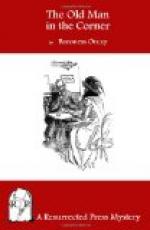“By this time a couple of constables had appeared upon the scene. D 21 had no intention of losing sight of his friend the tramp, and the man in the shirt had again made a dash for the latter’s collar at the bare idea that he should be allowed to ‘get along.’
“I think D 21 was alive to the humour of the situation. He suggested that Robertson (the man in the night-shirt) should go in and get some clothes on, whilst he himself would wait for the inspector and the detective, whom D 15 would send round from the station immediately.
“Poor Robertson’s teeth were chattering with cold. He had a violent fit of sneezing as D 21 hurried him into the house. The latter, with another constable, remained to watch the burglared premises both back and front, and D 15 took the wretched tramp to the station with a view to sending an inspector and a detective round immediately.
“When the two latter gentlemen arrived at No. 22, Phillimore Terrace, they found poor old Robertson in bed, shivering, and still quite blue. He had got himself a hot drink, but his eyes were streaming and his voice was terribly husky. D 21 had stationed himself in the dining-room, where Robertson had pointed the desk out to him, with its broken lock and scattered contents.
“Robertson, between his sneezes, gave what account he could of the events which happened immediately before the robbery.
“His master, Mr. Ferdinand Knopf, he said, was a diamond merchant, and a bachelor. He himself had been in Mr. Knopf’s employ over fifteen years, and was his only indoor servant. A charwoman came every day to do the housework.
“Last night Mr. Knopf dined at the house of Mr. Shipman, at No. 26, lower down. Mr. Shipman is the great jeweller who has his place of business in South Audley Street. By the last post there came a letter with the Brighton postmark, and marked ‘urgent,’ for Mr. Knopf, and he (Robertson) was just wondering if he should run over to No. 26 with it, when his master returned. He gave one glance at the contents of the letter, asked for his A.B.C. Railway Guide, and ordered him (Robertson) to pack his bag at once and fetch him a cab.
“‘I guessed what it was,’ continued Robertson after another violent fit of sneezing. ’Mr. Knopf has a brother, Mr. Emile Knopf, to whom he is very much attached, and who is a great invalid. He generally goes about from one seaside place to another. He is now at Brighton, and has recently been very ill.
“’If you will take the trouble to go downstairs I think you will still find the letter lying on the hall table.
“’I read it after Mr. Knopf left; it was not from his brother, but from a gentleman who signed himself J. Collins, M.D. I don’t remember the exact words, but, of course, you’ll be able to read the letter—Mr. J. Collins said he had been called in very suddenly to see Mr. Emile Knopf, who, he added, had not many hours to live, and had begged of the doctor to communicate at once with his brother in London.




